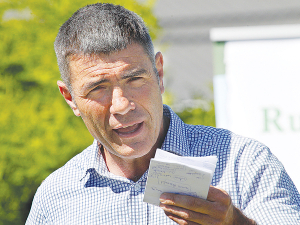NZ Red Meat Outlook 2026: Growth amid trade uncertainty
While things are looking positive for the red meat sector in 2026, volatility in global trade remains a concern, says the Meat Industry Association (MIA).
 Meat Industry Association chair Nathan Guy is not holding much hope for progress on HWEN before the general election.
Meat Industry Association chair Nathan Guy is not holding much hope for progress on HWEN before the general election.
Farmers are finding themselves "extremely confused" about He Waka Eke Noa (HWEN), says Meat Industry Association chair Nathan Guy.
Speaking at the Red Meat Sector Conference in Auckland last week, he noted that politics continue to dominate the issue.
HWEN – a partnership between farmers, agricultural sector industry bodies and Māori – with input from Primary Industries and Environment ministries was formed to price greenhouse gas emissions at farm level.
In October last year, the Government proposed a levy on farmers for greenhouse gas emissions to begin in 2025, a plan rejected by many farmers. Since then, there has been little progress, with a change in Prime Minister further stalling progress.
Guy says he’s not holding hope for too much progress before the general election.
“There aren’t a lot of sitting days (of Parliament) left but I could be wrong,” he says.
Guy says there remain different views between different ministries and departments in Wellington.
While HWEN remains under a cloud, the red meat sector agrees that things must change otherwise customers will leave them behind.
Guy wants progress on measurement and reporting based on science that considers NZ’s very different farming systems.
“It’s clear to me that an incoming government will have to make the big decisions into the future,” he says.
He acknowledged work underway like the AgriZero partnership between agribusiness and the Government, a catalyst and investment fund with an ambition to accelerate the reduction of agricultural emissions by 30% by 2030.
He says the partnership deals with methane and “turbo charging the commercialisation of tools within the toolbox of farmers to adjust inside the farm gate”.
He acknowledged meat companies Silver Fern Farms and Anzco for contributing to the programme. With the election around the corner, MIA has stepped up its engagements with politicians.
Recently, it launched its election manifesto and in the coming weeks it will release a briefing for incoming ministers.
Guy points out that dealing with red tape costs NZ meat processors and exporters $370m a year.
They also lose $200m a year on tariffs.
“These are mouthwatering numbers,” says Guy.
“We are doing everything possible to convince politicians of all parties what our main frustrations are, what they need to do as policy makers to support our sector,” he says.
The association has also reset its working relationship with the Ministry for Primary Industries (MPI).
A “bold” workplan has been agreed with MPI director-general Ray Smith, says Guy.
Guy and MIA chief executive Sirma Karapeeva are now meeting Smith on a quarterly basis.
“Because I know, as a former Minister for Primary Industries, that things occasionally slip,” he says.
“If you have a big cyclone event, people at MPI get pulled off, you have a big event like M. bovis, staff get pulled off.
“So, we want to ensure we are keeping the feet to the fire so that MPI know that we need to work collaboratively with them to deal with challenges we face.”
Guy thanked the Government for two recent free trade agreements, with the UK and the EU.
He says the UK FTA is a comprehensive deal which is celebrated by the sector.
“But we remain disappointed by the opportunities lost with the EU one,” Guy says.
Pāmu has welcomed ten new apprentices into its 2026 intake, marking the second year of a scheme designed to equip the next generation of farmers with the skills, knowledge, and experience needed for a thriving career in agriculture.
One team with 43 head, including a contingent from Mid Canterbury, are reflecting on a stellar NZ DairyEvent.
Fonterra farmer shareholders have approved the mechanism for a $2/share capital return expected from the sale of its global consumer and associated businesses.
Trainees in the horticulture industry studying towards a certificate or diploma can now apply for Horticulture New Zealand's (HortNZ) 2026 Industry Training Scholarships programme.
OPINION: The first three Global Dairy Trade (GDT) auctions have been a morale booster for farmers.
Former Fonterra executive Alex Turnbull has been appointed CEO to lead all five Yili Oceania Business Division companies in New Zealand.